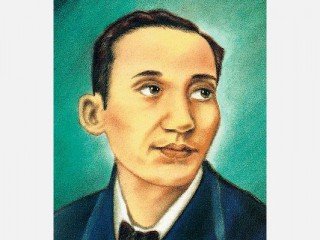
Apolinario Mabini biography
Date of birth : 1864-07-22
Date of death : 1903-05-13
Birthplace : Talaga, Tanauan, Batangas
Nationality : Filipino
Category : Famous Figures
Last modified : 2023-11-28
Credited as : Political philosopher, architect of the Philippine revolution, legacy
15 votes so far
Apolinario Mabini: A Pioneering Journey through the Philippine Revolution
Apolinario Mabini was a Filipino political philosopher and architect of the Philippine revolution. He formulated the principles of a democratic popular government, endowing the historical struggles of the Filipino people with a coherent ideological orientation.
Early Years in Tanauan
Apolinario Mabini was born on July 22, 1864, in the humble town of Talaga, Tanauan, Batangas. Raised amidst the struggles of an impoverished peasantry, his early life set the stage for a remarkable journey.
Mabini's intellectual prowess shone through as he pursued education at the Colegio de San Juan de Letran in 1881 and later at the University of Santo Tomas, where he earned his law degree in 1894. A testament to his resilience, he supported himself by teaching Latin and working as a copyist.
The Paralysis and Awakening
In 1896, Mabini faced a life-altering challenge, contracting an illness, likely infantile paralysis, which confined him to a wheelchair. This adversity, however, did not deter him from becoming a key figure in the unfolding Philippine revolution. Unbeknownst to many, Mabini was already a member of Jose Rizal's reformist association, the Liga Filipina.
From Skepticism to Subversion
Initially a pacifist reformist, Mabini's skepticism of Andres Bonifacio's armed uprising transformed into conviction as he recognized the people's fervent desire for emancipation. He authored subversive manifestos, passionately calling on all Filipinos to unite against Spanish oppression.
Architect of Revolutionary Change
Summoned by Emilio Aguinaldo in May 1898, Mabini played a pivotal role in formulating the historic decree of June 18, reorganizing local government under Filipino control. His commitment to interpreting the popular will and overseeing justice administration defined his role in the revolutionary struggle.
Clash with the Bourgeoisie
As the revolutionary congress convened in Barasoain, Malolos, in 1898, Mabini found himself at odds with the wealthy bourgeoisie's plans to draft a constitution. His belief that the congress's role was advisory led to a clash of ideologies. Despite his defeat, Mabini submitted his own constitutional plan based on the Statutes of Universal Masonry.
Eclipse and Exile
Mabini's conflict with the conspiracy of property owners in the congress led to his eclipse in 1899. Exposing opportunism within the Aguinaldo Cabinet, he staunchly opposed the Paterno-Buencamino clique. Upon the Aguinaldo camp's retreat from American forces, Mabini was captured on Dec. 10, 1899, refusing allegiance to the U.S. government. Deported to Guam in 1901, he continued supporting the insurgents in their ideological struggle until his death on May 13, 1903.
Legacy of La Revolution Filipina
Mabini's seminal work, "La Revolution Filipina," remains a testament to his progressive and democratic ideals. This reasoned analysis explores the ideological implications of the revolution against Spain and resistance to American invaders. His legacy endures as a selfless and dedicated patriot who mediated between the people's will and their leaders.
Unraveling Mabini's Ideals
For an in-depth understanding of Apolinario Mabini's life and works, explore Cesar Adib Majul's "Mabini and the Philippine Revolution" (1960). Majul's "The Political and Constitutional Ideas of the Philippine Revolution" (1957) and Teodoro A. Agoncillo's "Malolos: The Crisis of the Republic" (1960) provide valuable insights. Consult Teodoro A. Agoncillo and Oscar Alfonso's "A Short History of the Filipino People" (1969) for general historical context.
















